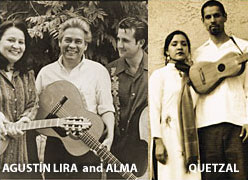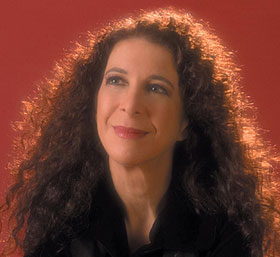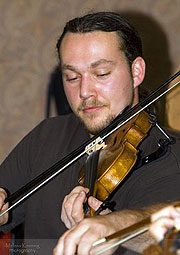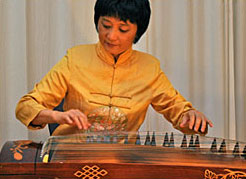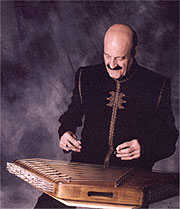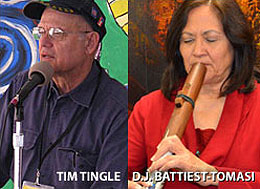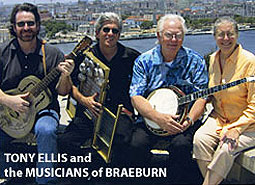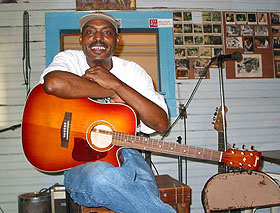| |
|||
|
2011 Homegrown ConcertsOnline Archive of Past Homegrown ConcertsAll of the materials from the Homegrown Concert Series are available to visitors in the Folklife Reading Room. Selected materials will be made available online as digital versions are available. Scroll down to see available webcasts and event flyer essays for the 2011 season.
September 14, 2011, 12:00 noonAgustín Lira and Alma & Quetzal: View the Webcast Running time 1:11:42 From the ashes of Los Angeles' 1992 uprising arose a collective of East Side musicians committed to respectfully continuing the legacy of over 70 years of Chicano Rock. Standing on the shoulders of giants like Lalo Guerrero, Ritchie Valens, Cannibal and The Headhunters, The Brat, Los Lobos, and many others, Quetzal has created a path that has earned them the recognition as “one of Los Angeles’ most important bands” (L.A. Times). Quetzal has shared the stage with a diverse list of artists such as Los Lobos, Zack de La Rocha, Ziggy Marley, Los Van Van, Taj Majal, Daara J, Ruben Blades, Fishbone, Cubanismo, Littlefeat, and Ozomatli. Led by Martha Gonzalez (vocals, tarima, chekere, congas) and Quetzal Flores (jarana, requinto doble, bajosexto, electric guitar), Quetzal plays music that is as rich and complex as their pluri-ethnic barrio experience. Since 2002 Quetzal has been central in facilitating a transnational dialogue between Chicana/o musicians and artists from California and Mexicano musicians and dancers from Veracruz, Mexico. Quetzal most recently completed its fifth studio album, titled Imaginaries, to be released in early 2012 on the Smithsonian Folkways label. Agustín Lira, a NEA National Heritage Fellow (2007), began his career in 1965, at the age of 19, when he co-founded the theater company El Teatro Campesino with Luis Valdez, during the Delano Grape Strike headed by Cesar Chavez. The company created songs and plays, performed at picket lines and rallies, and toured throughout the United States, demonstrating the power of artistic expression in uniting and inspiring the farmworker communities. Lira's powerful singing and socially relevant lyrics were at the heart of El Teatro Campesino and established his role as the preeminent musical voice of the early Chicano Movement. Since leaving Campesino, Lira has formed several other theater groups, composed music for films and recordings, and received numerous awards. Together with Patricia Wells Solórzano, Lira formed the musical group Alma in 1979. Alma features original compositions by Lira and is known for its mesmerizing duets, inspirational lead guitar playing by Wells, and incomparable, rhythmic bass by Ravi Knypstra. Alma blends Mexican, Latin American, American Folk, and Afro-Cuban styles, creating a hybrid: Chicano music. Alma has performed throughout the United States, Mexico and Cuba, produced several recordings, and scored the music for the award-winning film documentary, The Fight in the Fields: Cesar Chavez and the Farmworkers’ Struggle. The Alliance for California Traditional Arts
August 24, 2011, 12:00 noonSophia Bilides with Mal Barsamian and Mike Gregian (webcast forthcoming) Sophia Bilides sings and plays santouri (Greek hammered dulcimer) and zilia (finger cymbals). She has been called the foremost practitioner of Smyrneika, a cabaret tradition that originated among Greek refugees in Asia Minor. A second-generation Greek-Italian American, Sophia was raised in New Haven, Connecticut, where the refugees of the village of Permata, including her grandparents, had resettled. She grew up absorbing the songs of their generation, heard at weddings, dances, church events, and family gatherings. Despite many other musical influences vying for her attention, Sophia was drawn to the hearfelt and highly ornamented singing style of her Greek Asia-Minor roots. With many of the elders gone by the early 1980s, source material came primarily from her mentor, Dino Pappas, an important collector of early Greek recordings. She also collected songs from community members willing to sing into her tape recorder. Smyrneika songs arose out an urban population where the music of Greeks, Turks, Jews, and Armenians influenced each other in the early decades of the 20th century. This vibrant cultural scene was shattered when conflicts led to the 1922 Asia-Minor Catastrophe. The destruction of the port city of Smyrna (Izmir) led to the expulsion of two million Greeks from their homeland. Fortunately, highly skilled refugee musicians managed to keep alive their urban musical traditions by bringing their cosmopolitan talents to the Greek mainland and to America. Her goal of sharing Smyrneika with as wide an audience as possible is reflected in her performance venues, which have included the Richmond Folk Festival, the American Folk Festival, Lincoln Center, the Lowell Hellenic Culture Society, The Astoria Ethnic Music Festival, and the Maliotis Greek Cultural Center’s Asia Minor Commemoration. Bilides was named a Traditional Arts Finalist in the MCC Artist Fellowships in 2006, 2008, and 2010. For more information, visit Sophia Belides's website. In this concert, Sophia Bilides was joined by Mal Barsamian on oud and guitar, and Mike Gregian on doumbeleki (drum).
August 17, 2011, 12:00 noonDaniel Boucher and Friends
|
|
|
July 27, 2011, 12:00 noon
Ann Yao Trio
Traditional Chinese Zheng Music from Florida
View the webcast Running time 01:10:48
Ann Yao plays the zheng, a long, horizontal plucked zither that is one the most ancient musical instruments in China. Born into a family of musicians in Shanghai, she grew up immersed in Chinese folk and classical music. Ann moved to the U.S. in 1985, and began performing as a zheng soloist at Disneyworld’s Epcot Center in the early 1990s. She has performed at Lincoln Center, Carnegie Hall, the Metropolitan Museum of Art, and other venues with the innovative ensemble Music From China,![]() which promotes modern Chinese musical culture while preserving ancient Chinese music. Yao has also participated in a documentary project about Tang-era (618-907 A.D.) music, and has performed premier works featuring Yo-Yo Ma, Chen Yi, Tan Dun, Zhou Long, among others. She participated as a master artist in the Florida Folklife Apprenticeship Program in 1999 and 2008, and was recognized as a Florida Heritage Award Winner in 2009. She is joined in this performance by Wang Guowei
which promotes modern Chinese musical culture while preserving ancient Chinese music. Yao has also participated in a documentary project about Tang-era (618-907 A.D.) music, and has performed premier works featuring Yo-Yo Ma, Chen Yi, Tan Dun, Zhou Long, among others. She participated as a master artist in the Florida Folklife Apprenticeship Program in 1999 and 2008, and was recognized as a Florida Heritage Award Winner in 2009. She is joined in this performance by Wang Guowei ![]() playing the erhu, a two-stringed fiddle, and by Chen Yihan,
playing the erhu, a two-stringed fiddle, and by Chen Yihan,![]() playing the pipa, a pear-shaped lute.
playing the pipa, a pear-shaped lute.
|
|
July 20, 2011, 12:00 noon
Kiu Haghighi with Tooraj Moshref-Zadeh:
Persian santour and tombak music from Illinois
View the webcast Running time 0:53:54
Kiu Haghighi is known as a virtuoso in concert halls around the world on the santour, or Persian hammered dulcimer. Kiu began his lifetime study of the santour at the age of ten. At nineteen he was invited to join the Iranian Ministry of Education and Art. There he performed as the featured soloist in the Academy Orchestra and performed regularly on National Iranian Television. Kiu was an instructor at the Ministry of Education and Art until 1965, when he left Iran for study in the United States. His musical career in North America has included numerous performances in colleges, universities and concert halls. Kiu's work as both a performer and a composer on the santour combines and blends traditional Iranian forms with contemporary ones. A master of all the twelve melody types used as a basis for Iranian classical improvisation, Kiu has expanded the technical possibilities of the santour. His unusual speed in the movement of the leather-tipped mallets called mezrab is both well-known and extraordinary. Audiences always remember the energy and vigor of expression in his musical performances. He will be accompanied by Tooraj Moshref-Zadeh on the tombak, a Persian drum. For more information visit Kiu Haghighi's website.![]()
|
|
June 29, 2011, 12:00 noon
Tim Tingle and D.J. Battiest-Tomasi:
Oklahoma Choctaw Storytellers and Flute Players
View the webcast Running time 01:02:00
Both D. J. Battiest-Tomasi and Tim Tingle ![]() are enrolled as members of the Choctaw Nation of Oklahoma and regularly participate in tribal events. Both also share relatives who came on the Trail of Tears from the original Choctaw homelands in Mississippi. They speak Choctaw as a part of their performances. They normally perform individually, but have been asked to perform together on this occasion. Tim is a traditional singer, flute player, and drummer, and a nationally known performance storyteller, as well as a teacher, writer, and lecturer. He delivers lively historical and traditional stories, accompanying himself on the Native American flute, and sings Choctaw songs to the rhythms of a whaleskin drum. From 2002 to the present, Tingle has performed a traditional Choctaw story before Chief Gregory Pyle's Annual State of the Nation Address at the tribal gathering in Tushkahoma, Oklahoma, a Choctaw reunion that attracts over thirty thousand people. D. J. is also a flute player and storyteller, and works as a family counselor. Both have performed extensively across Oklahoma and are considered to be ambassadors of the Choctaw people, and both have recorded CDs of stories and music. Their favorite activity is to visit with elders immersed in oral tradition.
are enrolled as members of the Choctaw Nation of Oklahoma and regularly participate in tribal events. Both also share relatives who came on the Trail of Tears from the original Choctaw homelands in Mississippi. They speak Choctaw as a part of their performances. They normally perform individually, but have been asked to perform together on this occasion. Tim is a traditional singer, flute player, and drummer, and a nationally known performance storyteller, as well as a teacher, writer, and lecturer. He delivers lively historical and traditional stories, accompanying himself on the Native American flute, and sings Choctaw songs to the rhythms of a whaleskin drum. From 2002 to the present, Tingle has performed a traditional Choctaw story before Chief Gregory Pyle's Annual State of the Nation Address at the tribal gathering in Tushkahoma, Oklahoma, a Choctaw reunion that attracts over thirty thousand people. D. J. is also a flute player and storyteller, and works as a family counselor. Both have performed extensively across Oklahoma and are considered to be ambassadors of the Choctaw people, and both have recorded CDs of stories and music. Their favorite activity is to visit with elders immersed in oral tradition.
June 22, 2011, 12:00 noon
Tony Ellis, Banjo Master from Ohio, with the Musicians of Braeburn
|
|
View the webcast Running time 1:02:04
Tony Ellis is a prominent bluegrass banjo and fiddle player. He performed with Bill Monroe and the Bluegrass Boys, the originators of the bluegrass style, both at the Grand Ole Opry and on tour, for over two years, recording some 25 songs with them. In 1962 he received a standing ovation at Carnegie Hall when playing with the famous Mac Wiseman. Tony has performed and lectured at numerous colleges, universities, and music festivals throughout the country, including the 1986 Statue of Liberty Celebration in New York City. Tony has toured both Japan and Latin America as a musical ambassador. Tony opened the Folk Masters Series at Wolf Trap in 1994, played at the 1996 Olympics in Atlanta, and performed for President Clinton's Campaign tour. He has toured Australia (1999), New Zealand (1999 and 2000), Ireland (1999) and Great Britain (1999 and 2000). Tony has been interviewed on NPR's All Things Considered, by Pulitzer Prize winner Studs Terkel, and by the BBC. His music has been included on Ken Burns' Baseball series on PBS, on the BBC film documentary Echoes of America, on the popular TV series Party of Five, and in other theater and film productions. All of Tony's recordings have received critical acclaim. Tony has composed over eighty tunes and received eleven awards from ASCAP (American Society of Composers and Publishers). Tony was nominated for the National Heritage Fellowship Award, the highest honor America pays to her traditional artists. Accompanied by the Musicians of Braeburn (Tony's son, acclaimed singer/songwriter and fingerstyle guitarist William Lee Ellis, Tony's wife Louise Adkins on pump organ and Larry Nager on upright bass, mandolin and triple washboard), Tony Ellis presents an epic patchwork of American music, reaching from the Mississippi Delta to the Carolina Piedmont, from deep blues to joyful reels, from elegant waltzes to heart-wrenching Scottish airs. For more information, visit Tony Ellis's website.![]()
|
|
May 25, 2011, 12:00 noon
Ben Payton and the Thundering Harps: Blues Quartet from Mississippi.
View the webcast Running time 1:06:25
Ben Payton's voice resonates with a passion for life and his skills as a guitarist evoke the tradition of the original Delta blues greats such as Robert Johnson, Tommy Johnson, Charley Patton, and Son House. He was born in tiny Coila, Mississippi, in the hill country just east of the Delta. His early musical influences included his grandmother Mabel Johnson's gospel piano playing and his Uncle Joe Birch's blues guitar. When in his mid-teens, Ben moved to Chicago, where he soon became active in the city's blues scene. He worked regularly with Bobby Rush and Joe Evans and the Supersonics. Ben also played in the R&B bands The Oops and Womb From the Tomb. In 1970 Ben traveled to Morocco with jazz pianist Randy Weston, and stayed for a six-month engagement at a club. Ben was part of the R&B group Chicago Sounds, which opened the show and also backed Weston. Back home in Chicago, Ben worked with artists including Eddie Shaw and the Wolf Gang, Junior Wells, Fenton Robinson, Little Mack Simmons, Barkin' Bill Smith, Taildragger, Alvin Cash, Eddie C. Campbell, Bobby King, Big Moose Walker, Muddy Waters Jr., Vince McCollum, Tony Gooden, Doug McDonald, Ron Harris, and Ike Anderson. In 1977, Ben left the music scene but performed occasionally. In 2002, he moved back to his home state of Mississippi, and he returned to his roots, performing Delta-style blues. He will be performing at the Library with Steve Chester on rhythm guitar, Cyndi Clark on conga drums, and Kindrick Hart on electric bass. For more information, visit Ben Payton's website.![]()
| ||||

